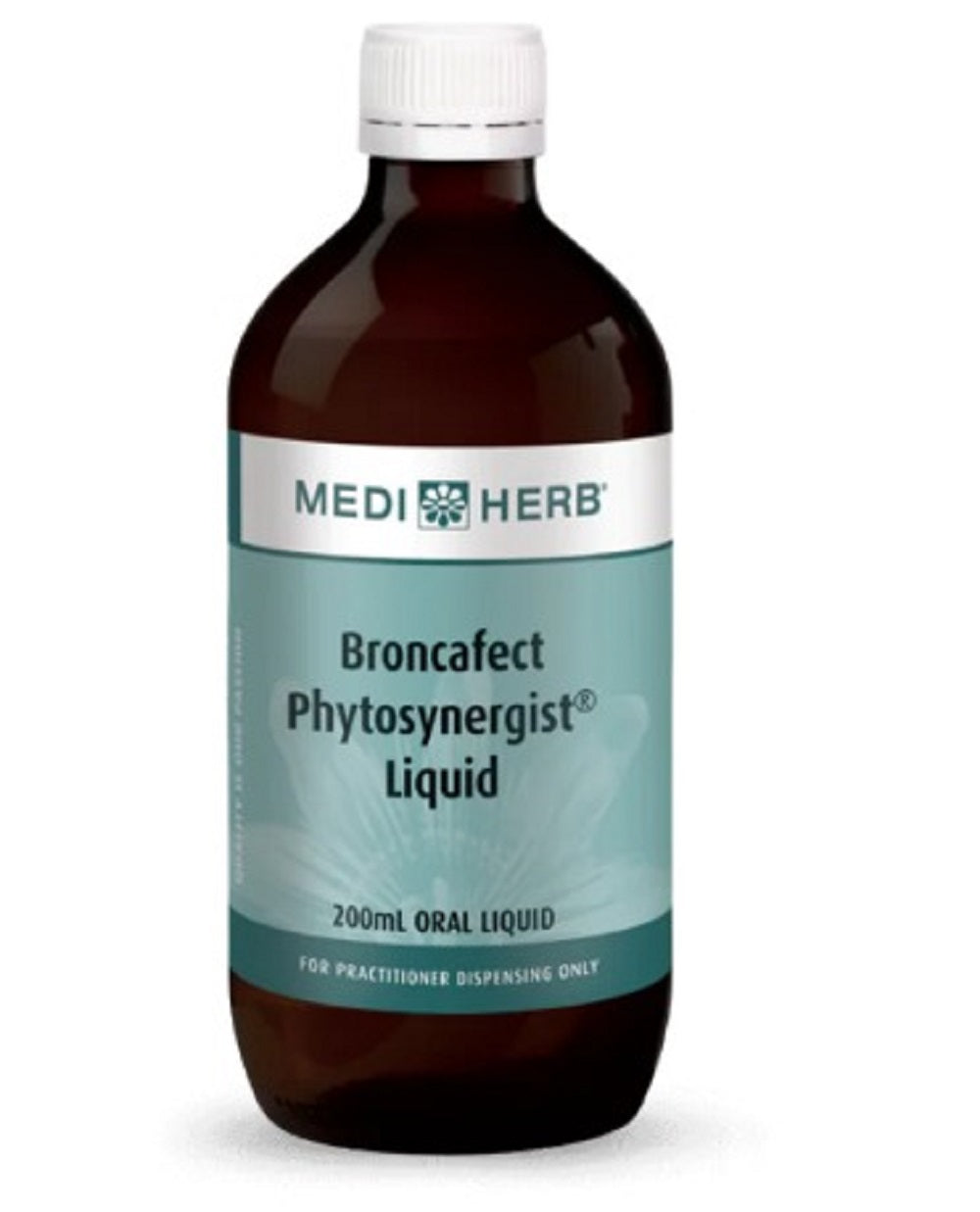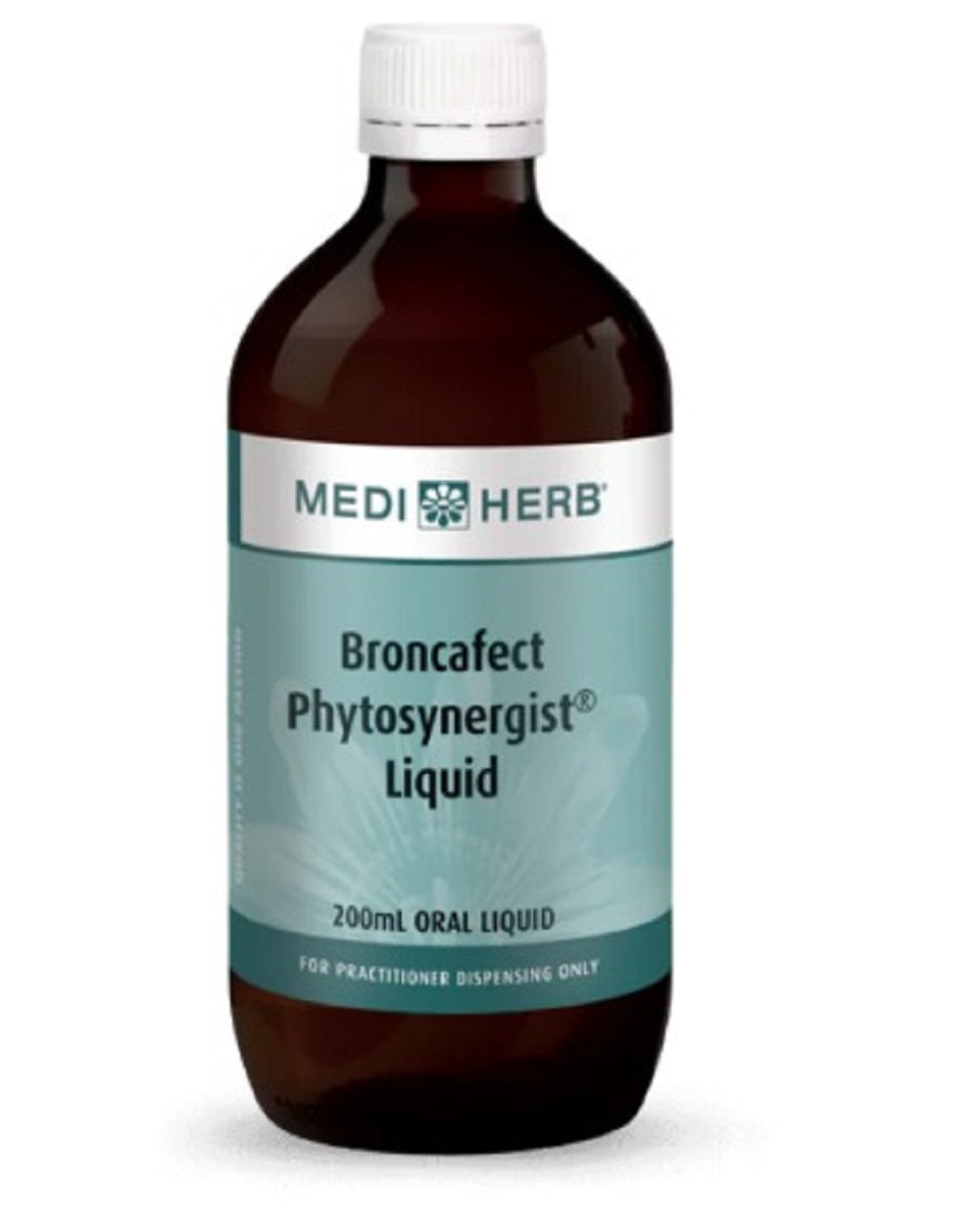1
/
of
1
MediHerb
MediHerb Broncafect Phytosynergist® Liquid 200ml
MediHerb Broncafect Phytosynergist® Liquid 200ml
Regular price
$179.95
Regular price
Sale price
$179.95
Unit price
/
per
Tax included.
Shipping calculated at checkout.
Couldn't load pickup availability
Broncafect Phytosynergist Liquid contains herbs used in Western herbal medicine to decrease symptoms of the common cold, relieve mild bronchial coughs and reduce excess chest phlegm.
Indications
- Echinacea root is traditionally used in Western herbal medicine to decrease the symptoms of the common cold including sneezing, cough, runny nose and general malaise
- Pleurisy Root, Licorice, White Horehound and Thyme are expectorants traditionally used in Western herbal medicine to clear excess respiratory tract mucus
- Licorice root is used in traditional Western herbal medicine as a demulcent, antitussive and antispasmodic to relieve mild bronchial coughs
- Pleurisy Root and Ginger root are traditionally used in Western herbal medicine as diaphoretics
Dose:
5 mL with water or juice 3 times daily
Ingredients:
| Each 5 mL dose contains: | |
| Glycyrrhiza glabra (Licorice) extract | 1ml |
| derived from root dry | 1.7g |
| Asclepias tuberosa (Pleurisy Root) extract | 1ml |
| derived from root dry | 500mg |
| Echinacea angustifolia (Echinacea) extract | 1ml |
| derived from root dry | 500mg |
| Thymus vulgaris (Thyme) extract | 1ml |
| derived from leaf dry 500 mg | 500mg |
| Marrubium vulgare (White Horehound) extract | 500mcl |
| derived from herb dry | 250mg |
| Zingiber officinale (Ginger) extract | 500mcl |
| derived from rhizome dry | 250mg |
Allergen Information
- No Added: Gluten, soya bean, milk, lactose, peanuts, tree nuts, fish, crustacea, corn, egg, sesame seeds, artificial sweeteners, colours or flavours.
- Vegan friendly.
Excipients
Ethanol and water.
Warnings:
- Contains ethanol 48% v/v.
- Caution in pregnancy.
- Contraindicated in hypertension (including women prone to hypertension during pregnancy), oedema and in those taking thiazide or loop diuretics.
- Caution is advised in patients receiving prednisolone or midazolam by injection. Caution in those taking warfarin or albendazole.
- Avoid long-term use in patients taking antihypertensive medications, digoxin and potassium-depleting drugs other than thiazide and loop diuretics (such as corticosteroids). Caution is advised in patients taking cilostazol due to the risk of hypokalaemia. Place patients on a high-potassium diet.
- Ginger should be used cautiously in patients taking antacids (it may decrease the effectiveness as Ginger increases gastric secretory activity) or crizotinib. • The risk of allergic reaction to Echinacea is very small, especially if preparations of the root are used since these are free of pollens.
- Contraindicated in patients taking immunosuppressant medication (e.g. transplant patients) - short-term therapy only is suggested in this instance.
- Thyme leaf may provide a small amount of vitamin K, which may affect some medications.
- Children under two years of age should not be treated for symptoms of respiratory tract infections without medical advice.
- Discontinue 7 days prior to general anaesthesia. If patient symptoms persist, seek additional professional advice.
Share


